High quality services for a healthier smile.
We believe the best approach is always to provide the maximum information to our customers to let them make an informed decision for theirselves and their families. Read more below about the services we offer to keep your smile healthy!
We at Grand Dental are proud to provide all phases of dental care for the community and surrounding area of New Haven, Connecticut. Dr. Iffat Nazneen and her team are happy to welcome all new patients with a complimentary consultation to customize their individual dental care.
The health of your teeth is our number one priority so bring your beautiful smile in to see us today! Not happy with your smile? We can change that!
Preventive Dentistry
Preventative dentistry is used on a regular basis to promote good oral health and hygiene. This includes a routine oral health exam, regular oral cancer and periodontal screenings and extras such as protective sealants and night guards for Bruxism (teeth grinding).

Oral Health Exams
The health of your teeth and soft oral tissues of your mouth depends on regular check-ups. Our automatic re-care system reminds you when it’s time to revisit us for your oral health exam, making sure you receive regularly scheduled follow-ups. One less thing for you to keep track of so you never miss another appointment with us!

Oral Cancer Screening
An oral cancer screening is included with your oral hygiene exam. This allows us to immediately detect and treat any problems found early enough to encourage the healthiest outcome possible.

Protective Sealants
Protective Sealants are used as an added layer of protection for the health of children’s teeth as well as for the preservation of teeth in adults.
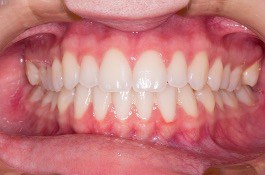
Periodontal Screening
Dental decay and periodontal (gum) disease can not only lead to teeth loss but can also negatively affect your overall physical and oral health. Our periodontal screenings (combined with routine dental hygiene appointments) help to protect against these issues by keeping an eye on the health of your teeth and gums.
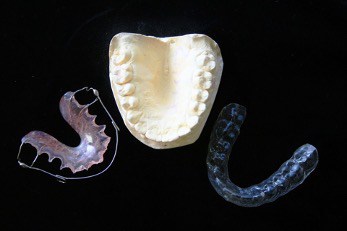
Night Guards for Bruxism
Unconscious teeth grinding (Bruxism) can quickly affect the quality of your sleep and can wear down or break your teeth if left unresolved. We offer custom made night guards to help provide a better sleep while preserving your precious smile. They provide a thin barrier between your teeth so that you can rest easy and comfortably.
Cosmetic Dentistry
There are a number of cosmetic dental procedures that can be done to correct or improve your smile. They range from teeth whitening, stain removal, veneers (reshapes or retextures teeth), bonding (repairs chipped enamel), and more. Cosmetic dentistry not only corrects the physical challenges in your mouth, but it will boost your confidence with your new dazzling smile that you can’t wait to show off!
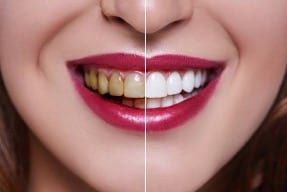
Teeth Whitening
We offer chemical treatment bleaching systems that are customized to suit your needs and budget. The procedure itself is fast and easy but the results are long-lasting- leaving you with a dazzling whiter smile that people are sure to notice.

Veneers
A dental veneer is best described as a layer of composite or porcelain (tooth-colored) that’s placed over the surface of your teeth to fix uneven spacing, alignment, chips and cracks, discoloration, and worn tooth enamel. Veneers can also be considered as restorative dentistry.

Restorative Dentistry
Restorative Dentistry is used to manage oral health problems and to restore your mouth back to a healthier, more aesthetically pleasing state. Veneers, fillings, crowns, bridges, full and partial dentures, and dental implants are all restorative dentistry but are also known as prosthodontic dentistry.

Dentures and Partial Dentures
Dentures- whether they’re full or partial- are prosthetic teeth individually designed to fit comfortably in your mouth and restore your smile, confidence, and overall oral health. They are made on a gum-colored base out of porcelain or acrylic.
A full denture replaces an entire arch of missing teeth while a partial denture replaces several missing teeth throughout the arch (if you’re not missing all your teeth, a partial will fill in the missing gaps). This allows you to keep your remaining natural teeth while also enjoying the benefits of a denture. Natural suction or mild adhesive keeps a full denture in place while a small attachment helps to keep a partial denture secure.
Find out more about dentures including implant-supported dentures on our website’s dental implant page.
5 Benefits of Having Dentures:
- Foods that were off-limits before may not have to be anymore! Incorporating some small changes to your eating habits (to avoid damaging the dentures) will have you back to eating your favorite foods again
- They’re made to closely resemble your natural teeth- so realistic, no-one will know!
- Fitted for your individual needs to ensure comfort and good design
- With quick and easy maintenance, keeping your dentures clean is just as simple as brushing your teeth
- Affordable- they carry a low upfront cost and a portion is usually covered by most dental insurance policies
Your dentures are a personalized process, therefore the procedure is not the same for every patient. Some patients may require tooth extractions that need several weeks to heal before their dentures can be designed. Some may choose an immediate denture which is done at the same time as extractions. The immediate denture requires a follow-up adjustment to accommodate the changes that happen in the mouth following a tooth extraction. Regular check-ups are required once you’ve adjusted to your dentures in case any further tweaks or alignments are needed. You can expect your prosthetic to last between 5-8 years before minor adjustments will no longer ensure that the denture fits well. When it gets to this point, new dentures will be required. If you’re considering dentures, please contact us today to schedule your personalized consultation.

Dental Crowns
Dental crowns allow you to save your natural teeth instead of having to invest in expensive replacements. A dental crown sits on top of a natural tooth and serves two purposes simultaneously:
It protects weak enamel and brings back original shape and appearance to the tooth therefore, crowns help to preserve damaged teeth rather than remove them. This approach is much better for long-term oral health.
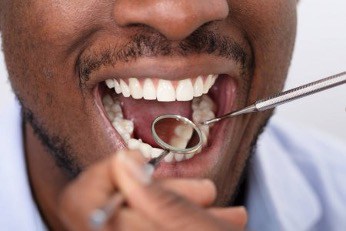
Fillings
Tooth-colored fillings are also called composite resin because that’s the material they’re made from. The resin is a mixture of glass, plastic, and other ingredients. They form into a flexible material that is then color-matched to the surrounding tooth enamel. The same resin is used in cosmetic dental bonding.
There are 5 steps when doing tooth-colored fillings:
- The area will be numbed (if required) depending on the depth of the cavity
- Prep the damaged tooth by removing spots or decaying tissue
- Insert the filling material (composite resin)
- A plasma curing light very quickly hardens the filling
- The shape of the filling is adjusted to the patient’s bite
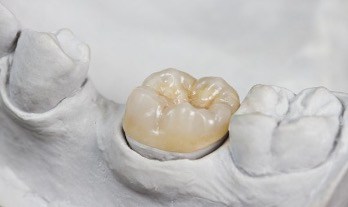
Dental Inlays and Onlays
When old fillings need to be removed or replaced, dental inlays and onlays are used. A dental inlay is like a filling and is inserted inside the top edges (cusp tips) of the tooth. A dental onlay covers the cusps of the tooth and is more extensive.

Endodontic Therapy
Endodontic Therapy is defined as: Treatment to eliminate bacteria from an infected pulp of a tooth. If this is not successful, a root canal procedure is then required.
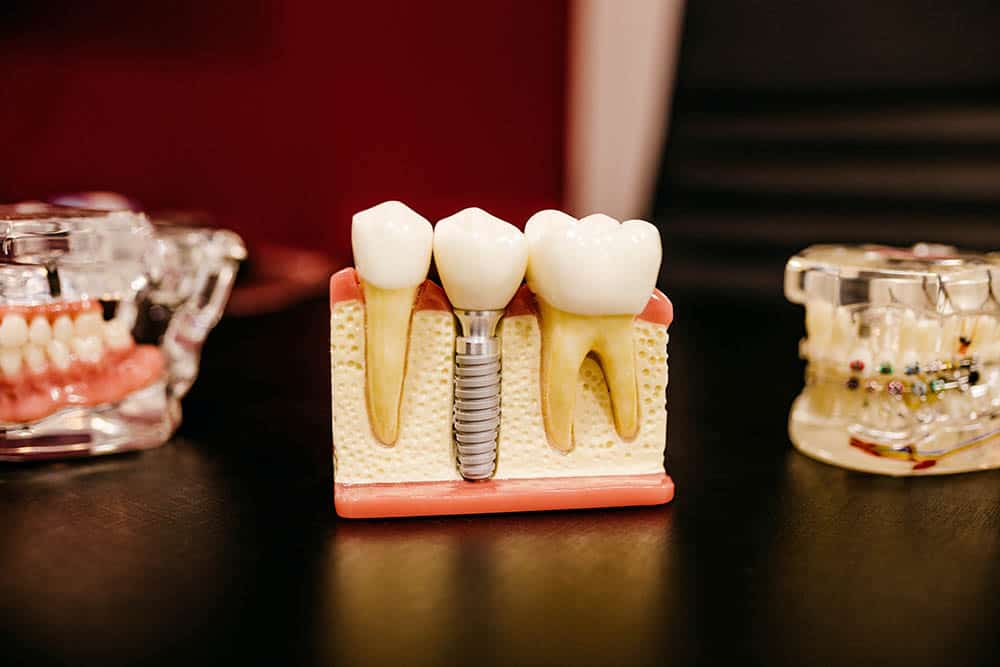
Root Canals
When damage or disease affects the tissue within the root of a tooth, it also affects the tooth’s nerves and blood supply. A root canal is then performed to save the tooth. This procedure may require a few pre-treatment visits but the root canal itself can often be done in one visit, leaving your tooth restored, and looking and feeling natural.
A Root Canal is performed in 3 basic steps:
- After local anesthetic has numbed the area, a small hole is made in the tooth and the canal (internal part of the root) is cleaned, disinfected and medicated before being temporarily sealed
- Once the tooth has cleared any infection, a biocompatible material is used to fill and seal the canal. This prevents bacteria from entering. A temporary filling may be used if a return visit is required to complete the root canal. Otherwise, a permanent tooth-colored filling or crown will be put in immediately. This is done on a case by case basis.
- If you do receive a temporary filling and don’t experience any problems, then a permanent restoration (usually a crown) will be put in within 3-4 weeks. Your beautifully restored tooth will not only look and feel natural but will still function just like your other teeth.
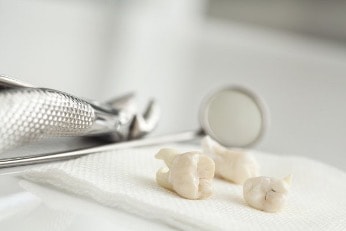
Tooth Extractions
Extracting teeth is always the last procedure we want to perform. Our goal is to do everything we can to save your natural teeth. If an extraction is necessary, the area around the tooth is numbed and the tooth is gently pulled. In most cases, the recovery period is just a few days. A dental implant or fixed bridge can replace the missing teeth.
5 Reasons Why a Tooth May Need to be Removed:
- The tooth has a cavity that’s too big for a filling or crown to restore it
- The tooth is so broken that it won’t hold any type of repair
- The bone under the tooth has weakened due to an infection or abscess
- A permanent tooth can’t push through because a baby tooth is blocking it
- Your mouth needs room to correct crowded and crooked teeth or for a denture to fit
Following a tooth extraction, you will have some soreness and tenderness in the affected area. But in just a few short days, you will be back to normal, doing and eating what you love.
Pediatric Dentistry
How important is the health of your children? Oral health is often overlooked and is usually not even thought of until the child starts school. We want to help change that mindset. If a child doesn’t see a dentist until they’re five years old, it’s very likely they already have a cavity or worse, multiple cavities. Starting off on a bad note is why kids become afraid of going to see the dentist so we want your child’s first impression to be a comfortable and positive experience. We know how it’ll affect their future outlook on coming in for a visit.
Cavities or tooth decay (caries) is the number one oral problem that our kids (toddlers to teens) are facing today. But most of that can be prevented!
As soon as the first tooth comes in, it’s already being attacked by plaque. We recommend your child’s first visit be before they turn a year old. We have an infant and toddler health program which teaches you how to care for your child’s teeth.
7 Important Things the Infant and Toddler Program Teaches Parents:
- To feed your child the right foods and to know their ingredients
- The difference between the two types of fluorides- topical and systemic
- At what age your child requires supplemental fluoride
- The negative effects that pacifiers and thumb sucking have
- How to brush and floss their little teeth
- Order of eruption and what you can expect when your infant’s teeth start coming in
- What you should do if there’s a dental emergency

Diet Counseling
Keep your child’s teeth strong and healthy. Learn how to prevent tooth decay by knowing what your kids are eating, read labels to know which ingredients to avoid, and become aware of what prolonged nursing or continual bottle use can do to teeth.

Oral Hygiene
You can learn how to brush and floss your child’s teeth right here in our office. We’ll teach you proven methods for even the most unruly toddler. Feel free to practice with us until you have the confidence to do it successfully at home.

Growth and Development
You’ll learn the usual order in which your baby’s teeth will come in and the important reasons for such a pattern. We have surefire ways to stop the use of pacifiers and thumb sucking, which will certainly affect the growth of their teeth.
